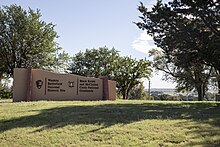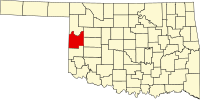Roger Mills County, Oklahoma
| Roger Mills County, Oklahoma | |
|---|---|

|
|
 Location in the U.S. state of Oklahoma |
|
 Oklahoma's location in the U.S. |
|
| Founded | 1891 |
| Named for | Roger Q. Mills |
| Seat | Cheyenne |
| Largest town | Cheyenne |
| Area | |
| • Total | 1,146 sq mi (2,968 km2) |
| • Land | 1,141 sq mi (2,955 km2) |
| • Water | 5.3 sq mi (14 km2), 0.40% |
| Population (est.) | |
| • (2013) | 3,743 |
| • Density | 3.2/sq mi (1/km²) |
| Congressional district | 3rd |
| Time zone | Central: UTC-6/-5 |
| Website | www |
Roger Mills County is a county located in the western part of the U.S. state of Oklahoma. As of the 2010 census, the population was 3,647, making it the third-least populous county in Oklahoma. Its county seat is Cheyenne. The county was created in 1891.
Roger Mills county is located above the petroleum-rich Panhandle-Hugoton Field, making it one of the leading sources of oil, natural gas and helium. The county also overlies part of the Ogallala Aquifer.
Roger Mills County takes its name from Roger Q. Mills, a senator from Texas. The town of Cheyenne in Roger Mills County is the location of the Battle of Washita River (also called Battle of the Washita; Washita Battlefield and the Washita Massacre), where George Armstrong Custer’s 7th U.S. Cavalry attacked Chief Black Kettle’s Cheyenne village on the Washita River on November 26, 1868.
The area covered by Roger Mills County had been part of the Cheyenne Arapaho reservation until after Oklahoma Territory was created and County E was formed. County E was renamed Day County. Day County was abolished. and Roger Mills County was created at statehood on November 16, 1907. The county's western boundary with Texas was moved eastward 3,800 feet (1,200 m) when the Supreme Court ruled that the 100th Meridian was farther east than originally supposed.
During the 1970s Roger Mills County and the surrounding area was the site of natural gas and oil development in the Panhandle-Hugoton field, the largest-volume gas field in the United States, and the world’s largest known source of helium. Between 1973 and 1993 the field produced over 8-trillion cubic feet (230,000,000 m³) of gas.
...
Wikipedia
